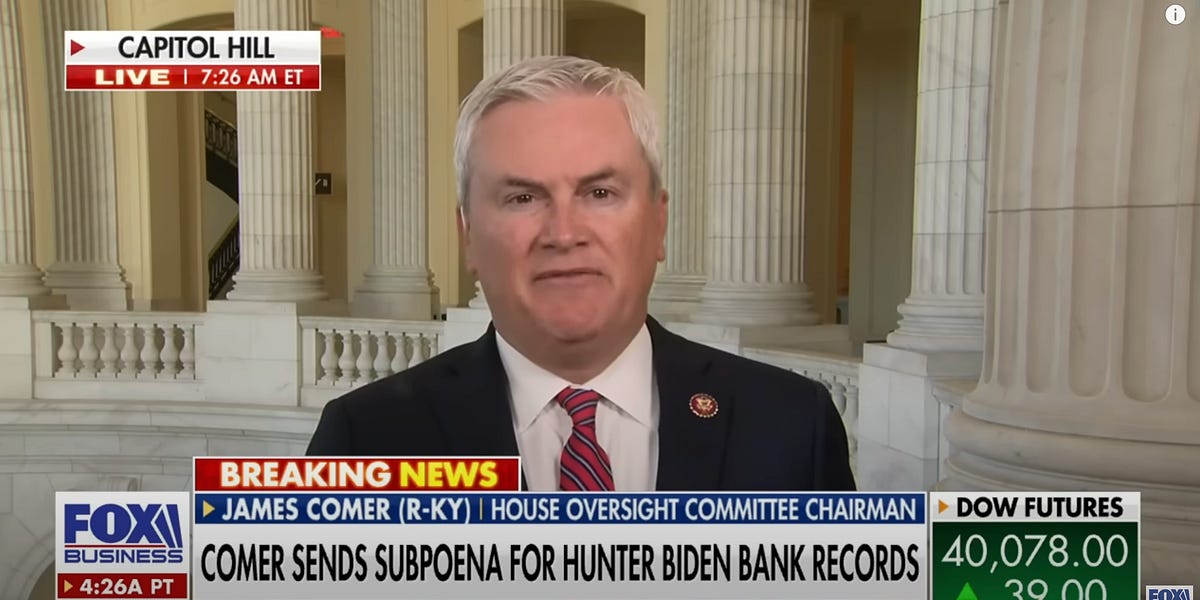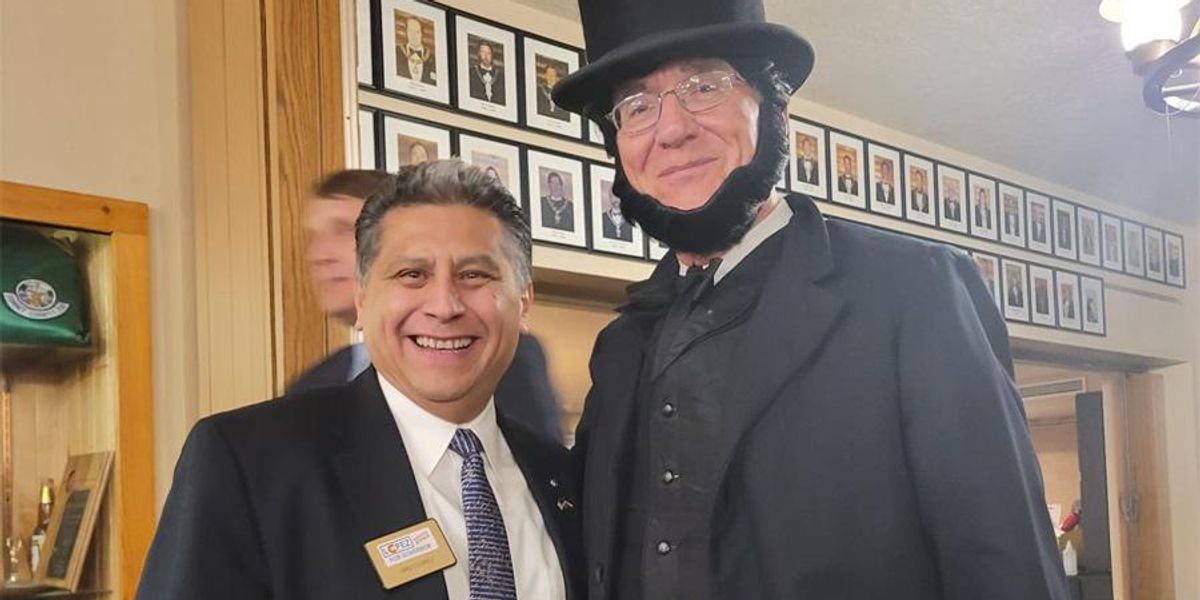The state of Colorado has a problem, at least if you’re a Republican seeking high office: In the past 50 years, the state has only elected one Republican as governor (Bill Owens, who served from 1999 to 2007). But one of the GOP candidates for governor this year, Greg Lopez, has a great idea that he thinks could fix that little difficulty, mostly by putting in place a kind of state electoral college, in which
rural counties’ voters would have far more power than voters in cities. Forget “one person, one vote,” because it’s far fairer if you don’t count all votes equally.
Don’t stare at us like that. It’s not our idea, it’s Lopez’s.
You might also be unsurprised to know that Lopez, the former mayor of Parker, Colorado, thinks Donald Trump really won the 2020 election but had it stolen from him. Just because Democrats far outnumber Republicans statewide shouldn’t mean they really represent Coloradans.
Yeah, You’ve Seen This Weirdo Before. And The Reporter Who Destroyed Him
You may remember Lopez from his
insane evasions in an interview earlier this month with Denver TV journo Kyle Clark, in which Lopez refused to own up to his very funny homophobic joke about Gov. Jared Polis (D), who is gay. Lopez had said to a Republican crowd, “I think it’s time we had a real first lady, don’t you?” The crowd ate that up, because Polis is married to a dude, and isn’t that just hilarious? Pressed to explain exactly what he’d meant by a “real first lady,” Lopez told Clark he simply was talking about what a wonderful gal his wife is, you see? They’ve been married 34 years!
Clark wasn’t having it, no thank you, and drily replied, “I think that there’s a chance that you think I and the folks watching are dumber than we are.”
Who Needs Tyranny Of The Majority When Tyranny Of The Minority Is More Fun?
Now Clark is back with the
lowdown on Lopez’s state electoral college idea, which a “political tracker” recorded when Lopez outlined it during a May 15 campaign appearance. It’s really the bestest idea, as long as you’re willing to throw out the idea that every citizen’s vote should count equally — and it should not, since that hasn’t helped Republicans. We like the part where he openly says he supports “doing away with the popular vote” just right there in plain English. We’ve bolded it below so you won’t miss it.
“One of the things that I’m going to do, and I’ve already put this plan together, is, as governor, I’m going to introduce a conversation about
doing away with the popular vote for statewide elected officials and doing an electoral college vote for statewide elected officials,” Lopez said.Lopez said his electoral college plan would weight counties’ votes based on their voter turnout percentage to encourage turnout.
“I’ve already got the plan in place,” Lopez said. “The most that any county can get is 11 electoral college votes. The least that a county can get is three.”
You can see the logic: Republicans keep losing the popular vote for president, but they sometimes win the Electoral College anyway, so clearly the electoral vote is fair and the popular vote
has to be suspect.
Here’s video from
KUSA/KTVD, which explains exactly how extremely the scheme would skew voting in Colorado. “Cockamamie ” doesn’t even begin to describe it.
Lopez’s campaign wouldn’t agree to talk to the TV station about the plan unless Clark would agree to
another sit-down interview with Lopez at his campaign headquarters. Gosh, considering the fact that Lopez became a national laughingstock after that earlier interview, we can only assume he and his campaign are masochists. (We kid. The homophobia and misogyny no doubt brought in all sorts of attention and money from rich GOP donors.)
Oh No, Not Math!
So instead, Clark and his team
decided to approximate how the scheme might have worked in the 2018 election that put Polis in office. Using the rough criteria Lopez outlined, they distributed between three and 11 electoral votes per county based on county turnout in the governor’s race. The rubric completely disregarded the population size of each county since Lopez said he’s getting rid of undemocratic ideas like the “popular vote.”
The results were pretty impressive. Instead of winning the 2018 election for governor by 10 points — the actual results — Polis would have been blown out of the water by Republican Walker Stapleton. In mere reality, Polis won 53.4 percent to Stapleton’s 42.8 percent. But an electoral system like Lopez wants would have “swung that race for Republicans by nearly 30 percentage points, resulting in the equivalent of an 18 percentage point victory for Stapleton over Polis.” Some details:
Colorado’s rural, conservative counties had seven of the 10 highest voter turnout percentages in the 2018 race for governor. Those counties had an average of 1,077 ballots cast in the election.
A 9NEWS analysis estimated that, under Lopez’s plan, Polis would have received 181 electoral votes to Stapleton’s 263.
And because Lopez’s system would apparently include no weighting for population size, his electoral college would be even more lopsided than the federal one, which at least includes some consideration of state population by including states’ House seats. The federal system still gives small states disproportionate power, but wowie, look at this hypothetical outcome in Colorado. We’ve added boldface to emphasize the population disparities:
Lopez’s weighting system would have given the
2,013 combined voters in Hinsdale, Kiowa and Mineral counties a total of 33 electoral votes, more than double the 14 electoral votes of Denver, Arapahoe and Adams counties’ combined 761,873 voters.
Well that seems fair. You want a little more representation, Denver, you’ll have to improve your voter turnout so maybe someday you’ll have equal political power to a county with
3,000 voters.
‘One Person, One Vote’ Is Not Even In The Bible
At that May 15 campaign appearance, Lopez explains why this scheme would be waaaaay better than merely letting the tyrannical depraved liberal majority in urban areas have their votes count equally to those of the God-fearing voters in rural areas:
“It’s not about one-person, one-vote. It’s about true representation.”
As we keep saying, this is what you get when you subscribe to the most extreme versions of the John Birch Society’s insistence that America isn’t a democracy, it’s a republic: Not only is democracy bad, anything that even allows too much majority influence is bad, too, so to truly avoid what the Founders feared was “the tyranny of the majority,” it’s probably best to let numerical minorities engineer the system to keep themselves in power. Representation is all fine and well, but the less it’s tainted by democracy, the better for the Republic.
Happily, U of Denver political science prof Sara Chatfield
told Clark in an interview that in the extremely unlikely event Lopez could become governor and persuade voters to pass it as a constitutional amendment, it’s so glaringly unconstitutional that it wouldn’t stand a chance in court. And wouldn’t you know it, the case that established one person, one vote as the standard came out of an earlier attempt to disenfranchise minorities!
Chafield pointed to the 1964 Supreme Court decision in
Reynolds v. Sims striking down Alabama’s plan to give one state Senate seat to each county.“The Supreme Court struck that down on the principle of one-person, one-vote. So I think that case, although it’s a little different, demonstrates that just because something is in the U.S. Constitution doesn’t mean it’s actually democratic or constitutional at the state level,” Chatfield said.
Mind you, while it’s an entirely hypothetical notion for Colorado, we can see a smaller, already red state like Idaho doing it just to make sure scary urban liberal coastal elites in Boise don’t get too much power in the state Lege.
This Guy’s FULL Of Bad Ideas!
Lopez’s campaign website says nothing about this state electoral college idea, although its
“issues” page does promise Lopez would issue an executive order that would effectively end automatic voter registration. The site explains it’s actually a vital moral issue, because “It is wrong for the state government to force a citizen to register to vote; that is an individual choice that should not be imposed by the government.” His ideas on choices are flexible; Lopez is fine with banning abortion with no exceptions, not even for the life or health of the pregnant person.
Also, in
that earlier interview with Clark, Lopez explained he wants to end Colorado’s statewide vote-by-mail system, because voting is too easy and people should show their commitment to citizenship by standing in line. Here’s the video, cued up to that bit of brilliance:
It’s about making sure people feel they’re providing their civic duty, that they’re standing in line because they’re proud Americans. A lot of people fought for the right to stand in line! You know, we stand in line for concerts, we stand in line for baseball games and football games. Why can’t we stand in line to vote? We don’t ask people to do this every week, we ask them to do it every two years.
Lopez said he believed that when voting is more inconvenient, people will actually be better informed about the issues, somehow. He also doesn’t buy the idea that standing in line could be a burden for people who don’t have a lot of time to stand in line, because “where there’s a will, there’s a way,” and people will obviously just have to make the time if they want to exercise their franchise. Indeed, he explained, if more people had to stand in line to vote, it would “send a message to future generations that this is our civic duty.”
After all, Martin Luther King simply wanted the right to vote. He never fought for voting to be
easy, and indeed, maybe the best way to honor his dream is to make sure people get clubbed and hit with firehoses before they can vote. That can be their way to prove their willingness to have some skin — and hair, blood, bone fragments, and bits of brain matter — in the game.
[
KUSA-KTVD / Photo: Greg Lopez on Facebook]
Yr Wonkette is funded entirely by reader donations. If you can, please give $5 or $10 a month to help us keep you informed. And all donors are equal! We won’t even limit how often you can comment by how much you give! (Hey, Rebecca, I have a great idea…)






































































